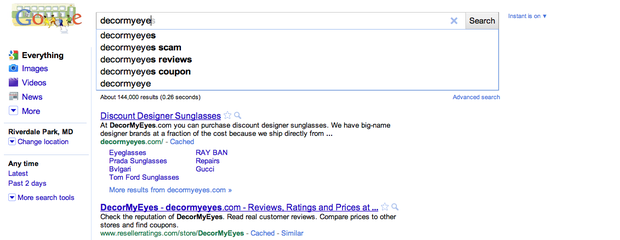Google Tweaks Search Recipe to Ding Scam Artists
Google has changed its search algorithm to penalize sites deemed to provide an "extremely poor user experience" following a New York Times story on a merchant who justified abusive behavior towards customers as a search-engine optimization tactic.
Amit Singhal, a Google fellow and a key search engineer, announced the change in a blog post today by noting "we were horrified to read about Ms. Rodriguez's dreadful experience." Sunday's Times article highlighted the experience of Clarabelle Rodriguez, a customer of a site called DecorMyEyes.com (deliberately not linked), who was berated by site owner Vitaly Borker after disputing a credit-card charge for a purchase of eyeglasses that appeared to be counterfeit.
Borker claimed that he enjoyed negative publicity about his company on consumer advocacy Web sites because it improved his ranking within Google search results. Although search experts noted that Borker wasn't actually benefiting from those reviews--most of the sites added "no follow" attributes to their links to his site--Google nonetheless decided to incorporate some notion of business ethics into the hundreds of signals that make up the Google algorithm, Singhal said.
"In the last few days we developed an algorithmic solution which detects the merchant from the Times article along with hundreds of other merchants that, in our opinion, provide a extremely poor user experience," Singhal wrote. "The algorithm we incorporated into our search rankings represents an initial solution to this issue, and Google users are now getting a better experience as a result."
Of course, just exactly what constitutes an "extremely poor user experience" was not detailed, and could be immediate fodder for those who feel Google's secret ranking sauce already holds too much power over the Internet. It's a difficult problem:
"We know that people will keep trying: attempts to game Google's ranking, like the ones mentioned in the article, go on 24 hours a day, every single day. That's why we cannot reveal the details of our solution--the underlying signals, data sources, and how we combined them to improve our rankings--beyond what we've already said," Singhal wrote.
Google is constantly tweaking the search algorithm that has made it billions, averaging more than one change a day,
